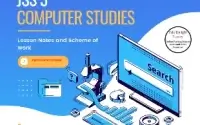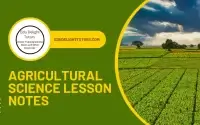Mid-Term Assessment: Environmental Hazards, Family Traits, and Climate Change Basic Science JSS 3 First Term Lesson Notes Week 7
Week 7: Mid-Term Assessment and Break
Subject: Basic Science
Class: JSS 3
Term: First Term
Week: 7
Age: 12 – 14 years
Topic: Mid-Term Assessment on Topics Covered
Assessment Overview
This assessment covers topics taught in the first half of the term. It evaluates students’ knowledge on subjects such as Drug Abuse, Environmental Hazards (Soil Erosion, Bush Burning), and Family Traits through objective questions, theory questions, and true/false statements.
Structure of the Mid-Term Assessment
Part A: Objective Questions
30 fill-in-the-blank questions with multiple-choice options (a, b, c, or d).
Part B: Theory Questions
20 short-answer questions.
Part C: True or False Questions
10 true or false statements.
Part A: Objective Questions (30 Questions)
- __________ refers to the burning of vegetation, usually to clear farmland.
a) Deforestation
b) Bush burning
c) Overgrazing
d) Reforestation - __________ is a chemical that depletes the ozone layer.
a) HFC
b) CFC
c) CO2
d) Methane - The protective layer that absorbs UV rays is called the __________.
a) Troposphere
b) Ozone layer
c) Greenhouse layer
d) Stratosphere - Soil erosion is caused mainly by __________.
a) Wind and water
b) Fertilizers
c) Bush burning
d) Crop rotation - __________ is a result of family traits.
a) Skin color
b) Climate
c) Education level
d) Rainfall - Overgrazing contributes to __________.
a) Deforestation
b) Desertification
c) Soil enrichment
d) Urbanization - __________ is the process of increasing Earth’s temperature due to trapped greenhouse gases.
a) Global warming
b) Soil erosion
c) Flooding
d) Deforestation - Chlorofluorocarbons are commonly used in __________.
a) Refrigerators
b) Books
c) Fertilizers
d) Vehicles - __________ is an inherited disorder caused by a lack of skin pigment.
a) Albinism
b) Diabetes
c) Cataract
d) Asthma - __________ is a control measure for soil erosion.
a) Terracing
b) Bush burning
c) Overgrazing
d) Air pollution - Intelligence can be inherited as a __________ trait.
a) Recessive
b) Dominant
c) Neutral
d) Uncontrolled - Excessive bush burning leads to __________.
a) Soil infertility
b) Air purification
c) More rainfall
d) Increased vegetation - __________ is an agreement to regulate substances that deplete the ozone layer.
a) Montreal Protocol
b) Kyoto Protocol
c) Paris Agreement
d) Stockholm Treaty - Which environmental hazard can lead to flooding?
a) Soil erosion
b) Bush burning
c) Deforestation
d) Recycling - __________ occurs when vegetation is removed for farmland or firewood.
a) Deforestation
b) Irrigation
c) Crop rotation
d) Afforestation
Part B: Theory Questions (20 Short-Answer Questions)
- Define bush burning and explain one reason why people practice it.
- What is deforestation, and how does it affect the environment?
- List two effects of soil erosion on farmland.
- Explain how family traits can influence health.
- What are chlorofluorocarbons (CFCs), and how do they affect the ozone layer?
- Describe one way to prevent flooding in urban areas.
- What is the relationship between global warming and greenhouse gases?
- Mention one control measure for desertification.
- State one environmental hazard that results from poor drainage systems.
- Explain the importance of the ozone layer to life on Earth.
- What is the difference between dominant and recessive traits?
- Describe how overgrazing leads to desertification.
- Give one example of an inherited trait.
- What is the greenhouse effect, and how does it contribute to climate change?
- Mention two ways to reduce soil erosion on farmland.
- Explain the role of afforestation in controlling desertification.
- What is the impact of ice melting due to global warming?
- Mention one health risk associated with exposure to UV rays.
- What is the primary cause of ozone depletion?
- How does bush burning affect air quality?
Part C: True or False Questions (10 Questions)
- The ozone layer is found in the mesosphere.
- False
- Soil erosion can be controlled through terracing.
- True
- Albinism is a dominant trait passed down from parents.
- False
- Global warming results from the buildup of greenhouse gases.
- True
- Flooding is a direct effect of deforestation.
- True
- The Montreal Protocol aims to reduce greenhouse gases.
- False
- Bush burning improves soil fertility.
- False
- Intelligence can be inherited as a family trait.
- True
- CFCs are found in books and paper products.
- False
- Overgrazing leads to desertification in arid areas.
- True
Conclusion
The teacher concludes the assessment by reviewing the correct answers with students, providing feedback, and identifying areas that need improvement.


